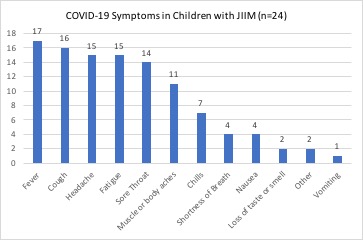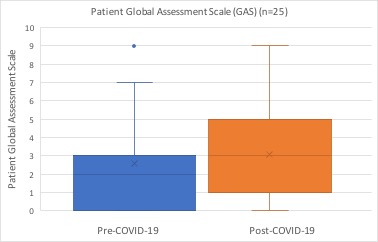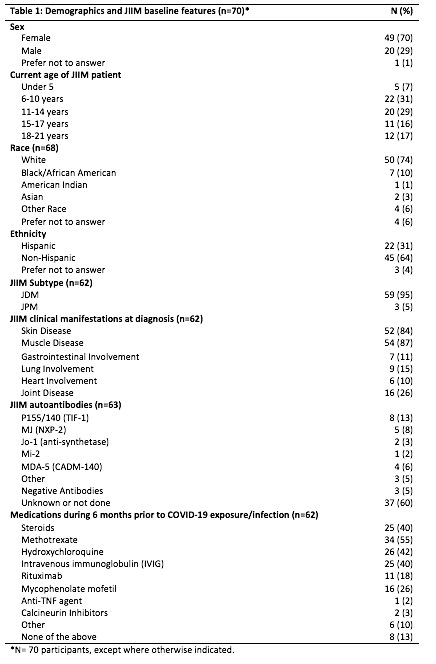Session Information
Session Type: Poster Session A
Session Time: 6:00PM-7:00PM
Background/Purpose: Since the onset of the COVID-19 pandemic, there have been concerns regarding the risks of SARS-CoV-2 infection in patients with juvenile idiopathic inflammatory myopathies (JIIM), with few reports of disease flare following COVID-19. In this study, we investigated the impact of the COVID-19 pandemic on children and adolescents with JIIM.
Methods: Data were collected using a patient/caregiver survey in English and Spanish via Research Electronic Data Capture (REDCap) database. Participants were eligible if they were diagnosed with JIIM and currently under the age of 21 years old. Caregivers were required to complete surveys for participants under 18 years old. Surveys were distributed via the CureJM organization, social media, the Childhood Arthritis and Rheumatology Research Alliance (CARRA) network and the Dr. Peter Dent Pediatric Rheumatology Bulletin Board.
Results: A total of 84 respondents accessed the survey, with 70 respondents consenting to participate (83%) and 54 completing the full survey (64%). Surveys were primarily completed by parents/caregivers (93%) with the majority of patients reported as having juvenile dermatomyositis (JDM) (95%), female sex (70%), White (74%) and non-Hispanic (64%) (Table 1). Median disease duration of JIIM participants was 4.06 years [IQR: 2.04, 8.70]. Among respondents, 27 out of 57 (47%) reported testing positive for COVID-19, with 7 (12%) testing positive on more than one occasion. The majority of patients (89%) reported typical symptoms of fever, cough, headache and fatigue (Figure 1). No patients were hospitalized or received medications to treat COVID-19. Four patients reported a flare of JIIM symptoms after COVID-19 including rash, weakness, myalgias/arthralgias and abdominal pain; three of these patients reported holding immunomodulatory medications in the context of active COVID-19. Among patients who tested positive for COVID-19, there was minimal change in patient global assessment scale (GAS) prior to and post-COVID-19 (median GAS [IQR]: 2 [0,3] and 3 [1,5] respectively; p=0.57) (Figure 2). A total of 69% of participants reported being vaccinated against COVID-19, with 9 (24%) reporting minor vaccine side effects including arm pain, headaches, fever and chills. One patient reported JIIM flare post vaccination. Medication modifications made in response to SARS-CoV-2 exposure, infection and vaccination included medications being held or delayed for 7-14 days in 16%, 26%, 22% respectively. Overall, 16% of respondents reported concerns related to delayed appointments, difficulty obtaining medication and avoidance of hospital care due to risk of exposure. In addition, 39% reported psychosocial impact including anxiety, depression, stress, social withdrawal, irritability, anger and two participants endorsed suicidal ideation.
Conclusion: Based on our survey, patients with JIIM had mild symptoms related to COVID-19 with none requiring hospitalization. The majority of patients tolerated COVID-19 vaccination well with minor side effects. Few patients report disease flare or worsening GAS post-COVID-19 or vaccination. Mental health concerns were demonstrated in JIIM patients during the COVID-19 pandemic.
 Figure 1: Twenty-four patients out of 27 who tested positive for COVID_19 reported acute COVID_19 symptoms. Total 108 symptoms were reported.
Figure 1: Twenty-four patients out of 27 who tested positive for COVID_19 reported acute COVID_19 symptoms. Total 108 symptoms were reported.
 Figure 2: Global assessment scale (GAS) for JIIM disease activity reported by participants pre- and post-COVID_19 (n=25)
Figure 2: Global assessment scale (GAS) for JIIM disease activity reported by participants pre- and post-COVID_19 (n=25)
To cite this abstract in AMA style:
Wahezi D, Jerome D, Rothschild E, Dvergsten J, Tarvin S, Kim S, Rubinstein T. The Impact of the COVID-19 Pandemic on Patients with Juvenile Idiopathic Inflammatory Myopathies [abstract]. Arthritis Rheumatol. 2023; 75 (suppl 4). https://acrabstracts.org/abstract/the-impact-of-the-covid-19-pandemic-on-patients-with-juvenile-idiopathic-inflammatory-myopathies/. Accessed .« Back to 2023 Pediatric Rheumatology Symposium
ACR Meeting Abstracts - https://acrabstracts.org/abstract/the-impact-of-the-covid-19-pandemic-on-patients-with-juvenile-idiopathic-inflammatory-myopathies/

